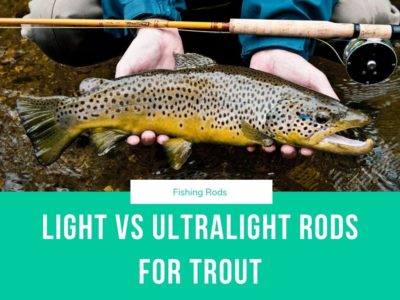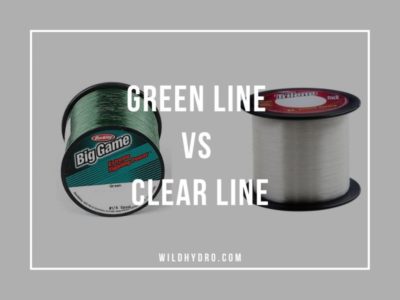Few feelings come close to the experience of landing a monster trout on light tackle. With all the advancements in rod technology, trout fishing rods are more sensitive, thinner and stronger than ever before. Now that such excellent gear is available, trout anglers often wonder whether they should be using a light vs ultralight rod for trout fishing.
While you can hit your favorite body of water and be lucky enough to score big trout with any old rod, these beautiful fish are so much more fun to catch when you have the right gear. Read on as we give our take on the age old question of whether light or ultralight rods are better for trout fishing.
Table of Contents
When should you use a Light vs Ultralight Rod for Trout?
Whether you should use a light vs ultralight rod for trout fishing is less a question of if and more about when. The truth is that both rods have their place when chasing trout.
To better understand when to use each rod you’ll need to know exactly what terms such as light and ultralight mean.
When you see the words light, ultralight, or heavy thrown around they are referring to the power of a rod. Rod power indicates the stiffness of the rod blank, which determines how much pressure is needed to bend the rod. The bigger the fish you are chasing the more power you will need.
While rod power isn’t an exact indicator of how large a fish the rod can handle, it does provide you with a rough idea of what kind of performance you can expect when chasing certain sized fish. You wouldn’t use an extra heavy rod to target panfish because you wouldn’t be able to feel them biting. The rod just isn’t sensitive enough. And you wouldn’t be able to land a king salmon on a lightweight rod because it would bend over on itself and possibly snap!
An ultralight outfit is usually ideal when fishing for smaller trout or using techniques requiring tons of finesse. However, ultralight tackle makes it more challenging to land the largest trout and it can be easier to lose a fish during the battle.
If you’re targeting trophy sized trout or you’re still working on learning those precision techniques that will let you land bigger fish on lighter tackle, then a light rod would be a better fit for you.
What Is a Light Trout Rod?
Light rods are a level up from ultralight rods in terms of rod power. These rods have a bit more backbone and they’re usually slightly longer and ready for somewhat heavier tackle than an ultralight rod.
Trout rods also have different actions depending on the model. The action indicates how far along the rod it will start to bend when a fish is on.
The slower the rod the closer to your hands the rod bends, increasing sensitivity and making it easier to cast light lures. Most light trout rods are rated as either slow or moderate. You need a lot of sensitivity when chasing smaller fish like trout..
Light trout rods are typically in the 6’6 to 7’0 size range.
What Is an Ultralight Trout Rod?
Ultralight rods represent the lightest and most flexible fishing rods on the market. They’re intended for the most lightweight tackle on the market, and they’re incredibly sensitive while also providing the most engaging fight when targeting trout.
Most ultralight trout rods have slow or X-slow action and are 6’0 to 6’6 in length.
Are Light Rods or Ultralight Rods Better for Catching Trout?
There’s really no wrong answer as to whether you should choose a light vs ultralight rod for trout fishing. These rods are like Coke and Pepsi, or Mustangs and Camaros. You’ll find fervent supporters on either side of the argument who are quick to tell you that one is better than the other.
It’s mostly a matter of personal preference.
The factors that go into whether each rod will work for you include:
- The type and size of trout you’re targeting
- The lures you’re fishing and how heavy they are
- How versatile you need the rod to be
The lighter the rod, the more sensitive it will be and the more lightweight the tackle you can effectively use with that rod. It also means that the smallest of bites will lead to a reaction from your rod, and if you set your hook there will be plenty of bend during a fight.
Light Rods
The lightest rods make it easy to detect even the most delicate bites, but bringing a large fish to shore can be more challenging.
While you can catch fish with virtually any setup, the thrill of the fight becomes all the more intense when you’re pairing the correct tackle to the fishing you’re doing. With the proper choice of rod and tackle, catching a 14” trout can be every bit as thrilling as landing an offshore giant.
Most seasoned anglers strive to use the lightest tackle that they can. Doing so ensures the highest level of sensitivity and finesse while also adding a certain degree of difficulty to fishing.
Yet there’s a fine line between gear that provides an excellent fight and equipment that lets you down when you’ve got a trophy fish on the other end of the line.
Compared to ultralight rods, light rods provide some extra backbone so they’re able to stand up to larger fish. These rods are a bit more forgiving to beginners, and they’re also applicable to a broader range of fishing than an ultralight outfit would be.
Ultralight Rods
Ultralight rods certainly offer the most sensitivity, and they allow you to use lighter tackle more effectively. These rods guarantee a hard fought battle, even when you’re reeling in a smaller fish.
If you’re fishing for smaller trout, or you’re keen to use the lightest tackle you possibly can, you’ll find that an ultralight rod is your best choice. Ultralight rods are also preferred by seasoned anglers who have the skill and finesse needed when they hook into a big fish that might otherwise overpower their gear.
A light rod is useful for targeting a more comprehensive range of fish. For beginners new to trout fishing or for those who need a rod that’s used in a bunch of different scenarios, a light trout rod will be the best option for you.
The Last Cast
I hope you’ve picked up a few tips and are a bit closer to a definitive answer as to whether to use a light vs ultralight rod for trout fishing. You should have a good idea of the type of rod that will work best for the waters you’re fishing and the type of fish that you’re chasing.
Whichever rod you choose be sure to get your line wet as often as possible for the best results. You can’t catch trout sitting on the couch!
What’s your preference in the light vs ultralight rod for trout fishing debate? Let me know in the comments.
Editor’s Picks



